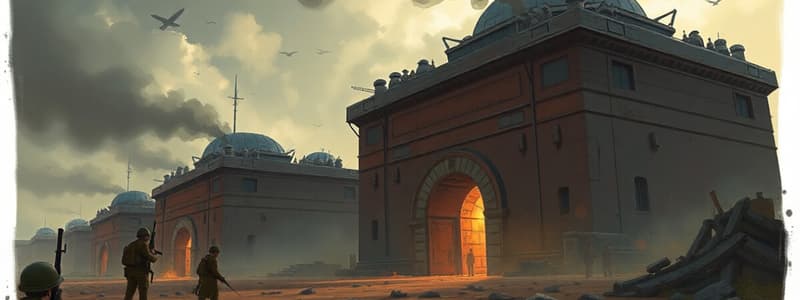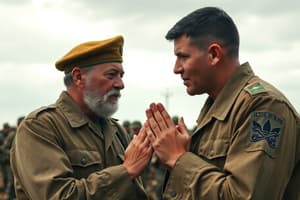Podcast
Questions and Answers
Initially, the family's reaction to the sudden sounds outside their home was primarily characterized by:
Initially, the family's reaction to the sudden sounds outside their home was primarily characterized by:
- Immediate fear and a seeking of familial comfort and security. (correct)
- Excitement, mistaking the sounds for celebratory fireworks.
- Curiosity and a desire to investigate the source of the disturbance.
- A sense of calm and resignation, as they were accustomed to such events.
The shift in the family's response to the ongoing conflict, as depicted in the passage, demonstrates:
The shift in the family's response to the ongoing conflict, as depicted in the passage, demonstrates:
- A complete desensitization to the violence, rendering them indifferent to the dangers.
- A growing resentment towards the army for failing to quickly resolve the conflict.
- An evolving adaptation to the constant threat, integrating war into their daily existence. (correct)
- An increasing proactive engagement in defense strategies against the attackers.
The detail about the electricity going out when fighting was nearby serves to illustrate:
The detail about the electricity going out when fighting was nearby serves to illustrate:
- The army's deliberate blackouts to confuse and disorient the Taliban forces.
- A symbolic representation of the darkness and uncertainty that war brings into their lives.
- The Taliban's strategic targeting of infrastructure to demoralize the population.
- A rudimentary yet functional method used by children to gauge the proximity of conflict. (correct)
Malala's recitation of the Ayat al-Kursi and her subsequent prayers that expanded in scope from her home to the world, best exemplifies:
Malala's recitation of the Ayat al-Kursi and her subsequent prayers that expanded in scope from her home to the world, best exemplifies:
The phrase 'Candy From The Sky' in the context of the bombing raids is most likely used to convey:
The phrase 'Candy From The Sky' in the context of the bombing raids is most likely used to convey:
The initial rumor that 'The Taliban were going to take control of Swat' after the first night of bombing primarily serves to:
The initial rumor that 'The Taliban were going to take control of Swat' after the first night of bombing primarily serves to:
The description of the family 'gripping one another harder until we drifted off to sleep' after each blast and shot suggests:
The description of the family 'gripping one another harder until we drifted off to sleep' after each blast and shot suggests:
The distinction made between bombing (Taliban), shelling (army), and machine guns (both) primarily reveals:
The distinction made between bombing (Taliban), shelling (army), and machine guns (both) primarily reveals:
The concluding statement, 'The army hadn't won, but it had at least driven the Taliban into hiding, if not away,' implies:
The concluding statement, 'The army hadn't won, but it had at least driven the Taliban into hiding, if not away,' implies:
Considering the overall narrative arc of this passage, the most significant thematic element explored is:
Considering the overall narrative arc of this passage, the most significant thematic element explored is:
Flashcards
Bombing
Bombing
The act of dropping bombs, often carried out by the Taliban in this context.
Shelling
Shelling
Firing artillery shells from cannons and helicopters, mainly by the army.
Machine guns
Machine guns
Rapid-firing guns used by both the Taliban and the army in conflicts.
Ayat al-Kursi
Ayat al-Kursi
Signup and view all the flashcards
Military operation
Military operation
Signup and view all the flashcards
Taliban
Taliban
Signup and view all the flashcards
Curfew
Curfew
Signup and view all the flashcards
Peace
Peace
Signup and view all the flashcards
Resilience
Resilience
Signup and view all the flashcards
Community response
Community response
Signup and view all the flashcards
Study Notes
The Author's Experience During War
- The author and siblings spent time indoors, observing the empty street,
- A loud explosion occurred, frightening them,
- The family huddled together, the dishes and furniture shook, and the windows rattled,
- The author and family were constantly afraid of blasts and shots that occurred,
- The author and siblings were gripped tightly together each time the city was bombed.
Types of Attacks During War
- Bombings were sometimes conducted using remote control, but other times by suicide bombers,
- Sometimes, bombing was done by projectiles launched from helicopters and cannons,
- Machine guns often were used by both sides in the war.
Daily Life During War
- The author felt it as though the family were waking up from a long, fitful dream,
- The author and family were cautious to check the air outside,
- The Taliban were rumored to take control of the city (Swat),
- Ten thousand more soldiers were brought in for the war,
- The author described the fighting to last one and a half years,
- The author had to sleep on blankets on the floor because the bed was crowded,
- The author and siblings had become accustomed to the bombing.
Prayers and Hopes During War
- The author and family frequently recited prayers from the Quran (Ayat al-Kursi).
- The author made wishes for peace for the whole world,
- The author prayed for the safety of their own family and their city,
- The author wished for peace, especially in Swat,
- The author learned to distinguish the different types of attacks.
Studying That Suits You
Use AI to generate personalized quizzes and flashcards to suit your learning preferences.




